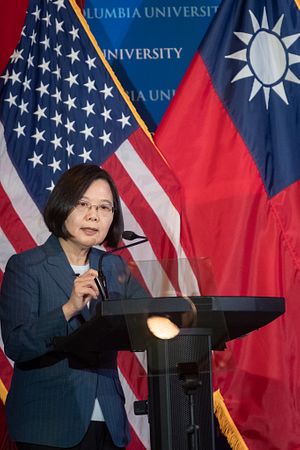Taiwan President Tsai Ing-wen will spend two days in Denver after spending two days in New York last week. The stopovers were scheduled to sandwich a visit to four of Taiwan’s Caribbean diplomatic allies amid a period of historically warm relations with the United States.
In New York, Tsai gave a speech at Columbia University in which she portrayed Taiwan and the United States as like-minded democracies facing the threat of “external forces” of authoritarianism.
“Like the United States, our path to democratization was paved with the blood, sweat, and tears of those who came before us,” she said. “Now, the task falls to us to carry on their mission and continue to bear the torch that lights the way for countries still on the path to democracy.”
Tsai will visit Denver on July 20 and 21 before returning to Taipei. U.S. stopovers – a mechanism used by Taiwanese leaders to visit the country, with which Taipei does not maintain official diplomatic relations – have historically been limited to one day. The New York and Denver stopovers had previously been approved by United States authorities.
The New York stopover drew protesters who waved Chinese flags and scuffled with Tsai’s supporters outside her hotel. It also led to a rebuke from Cui Tankai, the Chinese ambassador to the United States, who posted on Twitter: “Taiwan is part of China. No attempts to split China will ever succeed. Those who play with fire will only get themselves burned. Period.”
Tsai’s high-profile visits have been made possible by blossoming U.S.-Taiwan ties, which Taiwanese officials say are now stronger than ever. Her trip came one week after the United States finalized a $2.2 billion sale of tanks and anti-aircraft missiles to Taiwan, drawing a harsh reaction from Beijing, which announced last week it planned to sanction U.S. defense contractors involved in the deal.
The United States has been seemingly undeterred by Beijing’s criticism. In New York, Tsai also met with a bipartisan group of U.S. senators and representatives, including House Foreign Affairs Committee chairman Eliot Engel. Support for Taiwan within the U.S. Congress remains one of a few noncontroversial stances shared by both parties.
Tsai is banking on leveraging her ability to improve U.S.-Taiwan ties into a victory in next January’s presidential election, in which she will face Han Kuo-yu, the populist mayor of Kaohsiung who has called for warmer ties with China.
The Tsai administration has heavily promoted the United States stopover – and it has received considerably more attention than her visits to Haiti, St. Vincent and the Grenadines, St. Lucia, and St. Christopher and Nevis, four of Taiwan’s 17 remaining diplomatic allies. This likely corresponds with an upswing in Tsai’s domestic popularity, attributed by observers to her administration’s strong support of Hong Kongers protesting the city’s controversial extradition bill.
In March, coverage of Tsai’s visit to Pacific Island diplomatic allies was largely eclipsed by talk of Han Kuo-yu’s trip to Hong Kong, Macau, and China, where he met with government officials from China’s Taiwan Affairs Office.
Last August, Tsai made U.S. stopovers in Los Angeles and Houston months after China coaxed two of Taipei’s diplomatic allies, Burkina Faso and the Dominican Republic, into switching their recognition to Beijing. Days after Tsai’s return, El Salvador joined them by abandoning Taiwan in favor of the People’s Republic of China (ROC).
Taiwan has not lost any diplomatic allies since El Salvador’s defection, possibly removing the pressure her administration faced last year to salvage its remaining diplomatic relationships and avoid looking weak ahead of the country’s regional elections.
The lack of focus on Taiwan’s diplomatic relationships may also give Tsai’s administration latitude to continue de-emphasizing those ties, a strategy reportedly favored by some within her Democratic Progressive Party (DPP) who would like Taiwan to reach “diplomatic zero” – a situation in which the Republic of China (ROC) has no remaining formal allies. In theory, that would hasten a departure from the ROC moniker and a move toward a sovereign nation of Taiwan.
But speculation is mounting that the Solomon Islands, which still recognizes Taipei, will soon switch its allegiance to Beijing. And two of Taiwan’s Central American allies, Guatemala and Honduras, could be subject to a suspension of United States aid, which could hasten their potential switch to the People’s Republic.
Chinese leadership could wait to time future diplomatic defections to have maximum impact before Taiwan’s upcoming presidential election – switches from China to Taiwan, regardless of their real-life impact, tend to make a Taiwanese administration’s foreign policy look ineffectual to voters no matter their political affiliation.
Despite this, Beijing has failed to chip away at the growing bond between Taiwan and the United States. Han, the Kuomintang (KMT) presidential candidate, has promised to maintain relations with both the U.S. and China but has not provided a coherent path toward doing so – leading to the upcoming election being cast in some corners as a zero-sum battle between ties with the United States and ties with China.

































